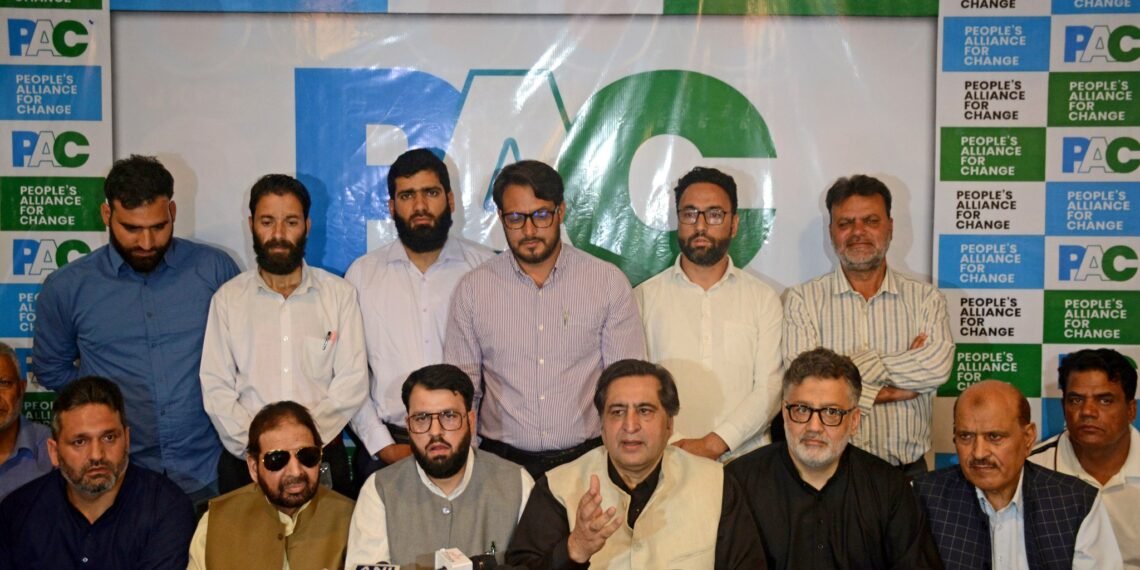By Pravin Kumar
In a surprising political realignment, Sajad Gani Lone, a former separatist turned pro-India politician, has bridged a decades-long ideological divide by forming the People’s Alliance for Change (PAC) alongside the Jamaat-e-Islami-backed Jammu and Kashmir Development Front (JDF) and former minister Hakim Mohammad Yaseen’s People’s Democratic Front (PDF).
The alliance, launched at a joint press conference in Srinagar on Monday, marks a significant moment in Jammu and Kashmir’s turbulent political landscape, uniting groups with historically divergent ideologies under a shared banner of regional aspirations.
The alliance aims to break the cycle of repetitive and divisive politics, offering a unified platform for the people of Jammu and Kashmir.
Sajjad Gani Lone, who spearheaded the initiative, described the PAC as a “purely electoral alliance” with broader societal goals.
“We have seen pain, and we have not inflicted pain. This is a platform where all have suffered, and this platform will lead to change,” Lone said, highlighting the alliance’s commitment to dignity and direction.
He revealed that discussions with JDF leaders had been ongoing for months before PDF was brought on board. “We are giving our people an alternative,” he added, criticizing the region’s cyclical political games, which he termed a “chor-police” pattern that shifts every six years. Lone stressed the need for a consistent voice “from Srinagar to Delhi.”
ALSO READ: Can the “leaderless” Kuki-Zo Movement Survive Its Divisions Without a Moses to Lead Them?
Shamim Ahmad Thokar, a former Jamaat-e-Islami member and JDF president, underscored the alliance’s foundation in shared experiences of hardship. “We come from different political backgrounds but carry the same pain and goals. We have had enough leaders who speak one language in Delhi and another in Kashmir. That era must end,” Thokar said.
He emphasized that only those who have faced imprisonment or lost loved ones can truly understand the region’s needs, positioning the PAC as a voice for the marginalized.
Hakim Mohammad Yaseen echoed these sentiments, stressing that the alliance transcends individual party ambitions. “We are not here for positions or power. This alliance is different. We have decided to rise above our individual parties and work together. Our goal is political stability and a shared future,” Yaseen said.
Declaration for Change
The alliance released a founding document titled Declaration for Change, outlining its core demands and vision. The document calls for:
Restoration of Article 370 and Article 35A, which were revoked in August 2019.
Full Statehood for Jammu and Kashmir.
Equal rights for all citizens.
A general amnesty for political prisoners and youth affected by the conflict.
The declaration also critiques the current reservation system as “discriminatory” and demands an end to the “politics of fear and confusion.”
It asserts, “The future of Kashmir cannot be shaped by those who keep switching sides. If Kashmir is to move forward, it needs one voice, one roadmap, and one commitment—to peace, progress, and the people.
The formation of the PAC comes at a time when Jammu and Kashmir’s political landscape remains fraught, following the abrogation of Article 370 and the subsequent reorganization of the region into a Union Territory.
The alliance’s emphasis on unity and a clear agenda could resonate with voters disillusioned by traditional political alignments. By positioning itself as an alternative to mainstream parties, the PAC aims to consolidate regional aspirations and challenge the status quo.
Analysts suggest that the alliance could reshape electoral dynamics in the region, particularly if it gains traction among youth and conflict-affected communities. However, its success will depend on its ability to translate rhetoric into actionable policies and navigate the complex socio-political realities of Jammu and Kashmir.
READ: Tribal Protest May Force Assam to Scrap Two More Mega Projects
The PAC’s leadership has pledged to engage with the public through rallies, community outreach, and a detailed manifesto in the coming weeks. A video of the press conference, widely circulated on social media, has already sparked discussions among residents and political observers.
As Jammu and Kashmir looks toward an uncertain political future, the People’s Alliance for Change has positioned itself as a bold new voice, promising to prioritize the region’s dignity, stability, and aspirations. Whether it can deliver on its ambitious vision remains to be seen, but its formation marks a pivotal moment in the region’s evolving political narrative.














